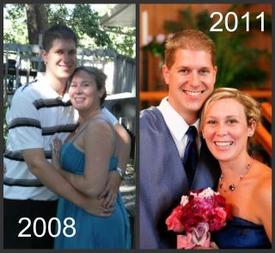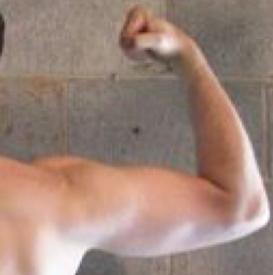The dilemma of eating clean but not enough calories...
Options
Replies
-
One more thing (since you asked about this) - you won't necessarily feel extra hungry in starvation mode. I personally don't like that term. Think of it as a mode in which your body has lowered it's metabolism because it's so used to not getting enough calories that it has adapted and is forcing itself to run on less. You probably *won't* feel all that hungry if you experiencing this, actually. Hunger is not the best trigger to go by, because bodies do not always tell us if they are not being properly fueled. They will if they are used to being properly fueled, but after awhile they adjust and "give up" and just learn to operate without complaint on the too-low calorie levels.
Absolutely correct.0 -
Im in the same boat, I feel like I dont get 1200 calories but over in the other areas, so what are more important getting calories or not going over in other areas such as fats, sugar, sodium.0
-
This is what people are not understanding.
It is not about the numbers. Plain and simple.
If you are eating whole and natural foods, then your calorie counts are going to be much lower than most other peoples.
It is not about quantity. It is about quality. We as humans don't have to have XXX calories. Feed your body with whole foods, lots of veggies, good quality proteins and fats, some fruit intake and you may only consume about 800 - 1000 calories per day, but it is very nutrient dense food.
Your body won't want or need for anything because you are truly nourishing your body.0 -
This is what people are not understanding.
It is not about the numbers. Plain and simple.
If you are eating whole and natural foods, then your calorie counts are going to be much lower than most other peoples.
It is not about quantity. It is about quality. We as humans don't have to have XXX calories. Feed your body with whole foods, lots of veggies, good quality proteins and fats, some fruit intake and you may only consume about 800 - 1000 calories per day, but it is very nutrient dense food.
Your body won't want or need for anything because you are truly nourishing your body.0 -
Why does it say that you are under your calories then when you enter in your food if you are under 1200?0
-
This is what people are not understanding.
It is not about the numbers. Plain and simple.
If you are eating whole and natural foods, then your calorie counts are going to be much lower than most other peoples.
It is not about quantity. It is about quality. We as humans don't have to have XXX calories. Feed your body with whole foods, lots of veggies, good quality proteins and fats, some fruit intake and you may only consume about 800 - 1000 calories per day, but it is very nutrient dense food.
Your body won't want or need for anything because you are truly nourishing your body.
Calories are energy. Bodies require ENERGY to properly operate. We all agree that your body is better off if you get that energy from clean, healthy foods, but regardless of where you are getting it from, you still need enough energy. If I burn 3000 calories (or even 2500) in a day, 800 or even 1000 is not going to be enough for me to operate optimally (even if I am getting the property vitamins/minerals), regardless of how clean/healthy that energy is. Only certain people can operate well on a super high deficit (primarily people with a LOT of weight to lose) - everyone else is better off keeping their deficit at reasonable numbers.
Quality is important, but so is quantity. You need the right quantity of energy to keep your body running optimally - a low calorie diet may work for you, but for many people, 800-1000 calories of even the most nutritious, clean food won't necessarily be enough. It's not the best idea to go around telling everyone that anyone can be perfectly healthy eating 800-1000 calories a day if they just eat clean, because that's just not necessarily going to be true for everyone (or even most people).0 -
This is what people are not understanding.
It is not about the numbers. Plain and simple.
If you are eating whole and natural foods, then your calorie counts are going to be much lower than most other peoples.
It is not about quantity. It is about quality. We as humans don't have to have XXX calories. Feed your body with whole foods, lots of veggies, good quality proteins and fats, some fruit intake and you may only consume about 800 - 1000 calories per day, but it is very nutrient dense food.
Your body won't want or need for anything because you are truly nourishing your body.
Whole foods, lots of veggies, good quality proteins and fats, fruit intake is good, nutrient-dense food, but you need enough of it to fulfill your body's nutrient and energy needs. "Density of nutrients" or "density of caloric/fat/protein/carb/etc content" means you need less of the "denser" food to be properly fueled, not that you can fuel less because there's more nutrients per ounce.
Think of the nutrient-dense food you describe as a battery with 100 units of power efficiently packed into it, versus the other guy's junky-food battery that is of identical size, but unlike your battery only has a less-densely-packed 50 units of power inside it.
Now imagine a device that uses 1000 units of power a day and needs to run pretty much constantly. Regardless of the fact that your battery is more "nutrient-dense," you still have to use 10 of your batteries per day to fill the needs of the device. Sure, the other guy has to use 20, but you still need to feed that device 10 batteries a day or it will shut down until the next day. The advantage is that you need less of your batteries, but the power requirements do not change.
Just like the human body. The quality of the food can vary, but the basic needs of the body to function normally are not changed by how many units of nutrition are in each bite. You just get to satisfy your needs with fewer bites.0 -
This is what people are not understanding.
It is not about the numbers. Plain and simple.
If you are eating whole and natural foods, then your calorie counts are going to be much lower than most other peoples.
It is not about quantity. It is about quality. We as humans don't have to have XXX calories. Feed your body with whole foods, lots of veggies, good quality proteins and fats, some fruit intake and you may only consume about 800 - 1000 calories per day, but it is very nutrient dense food.
Your body won't want or need for anything because you are truly nourishing your body.
Whole foods, lots of veggies, good quality proteins and fats, fruit intake is good, nutrient-dense food, but you need enough of it to fulfill your body's nutrient and energy needs. "Density of nutrients" or "density of caloric/fat/protein/carb/etc content" means you need less of the "denser" food to be properly fueled, not that you can fuel less because there's more nutrients per ounce.
Think of the nutrient-dense food you describe as a battery with 100 units of power efficiently packed into it, versus the other guy's junky-food battery that is of identical size, but unlike your battery only has a less-densely-packed 50 units of power inside it.
Now imagine a device that uses 1000 units of power a day and needs to run pretty much constantly. Regardless of the fact that your battery is more "nutrient-dense," you still have to use 10 of your batteries per day to fill the needs of the device. Sure, the other guy has to use 20, but you still need to feed that device 10 batteries a day or it will shut down until the next day. The advantage is that you need less of your batteries, but the power requirements do not change.
Just like the human body. The quality of the food can vary, but the basic needs of the body to function normally are not changed by how many units of nutrition are in each bite. You just get to satisfy your needs with fewer bites.
Well said - and right on.0 -
Wow, lots of explanation. Thanks for this! It really helps. It at least helps me understand about calories a bit better and that I don't feel so guilty when I'm not hitting my calorie mark. I am eating really clean and really healthy and I do believe quality over quantity...
Thank you all again!
Tiffany0 -
This makes sense to me...thanks for posting0
Categories
- All Categories
- 1.4M Health, Wellness and Goals
- 392.1K Introduce Yourself
- 43.6K Getting Started
- 259.9K Health and Weight Loss
- 175.7K Food and Nutrition
- 47.4K Recipes
- 232.4K Fitness and Exercise
- 403 Sleep, Mindfulness and Overall Wellness
- 6.4K Goal: Maintaining Weight
- 8.5K Goal: Gaining Weight and Body Building
- 152.8K Motivation and Support
- 7.9K Challenges
- 1.3K Debate Club
- 96.3K Chit-Chat
- 2.5K Fun and Games
- 3.4K MyFitnessPal Information
- 23 News and Announcements
- 983 Feature Suggestions and Ideas
- 2.4K MyFitnessPal Tech Support Questions






